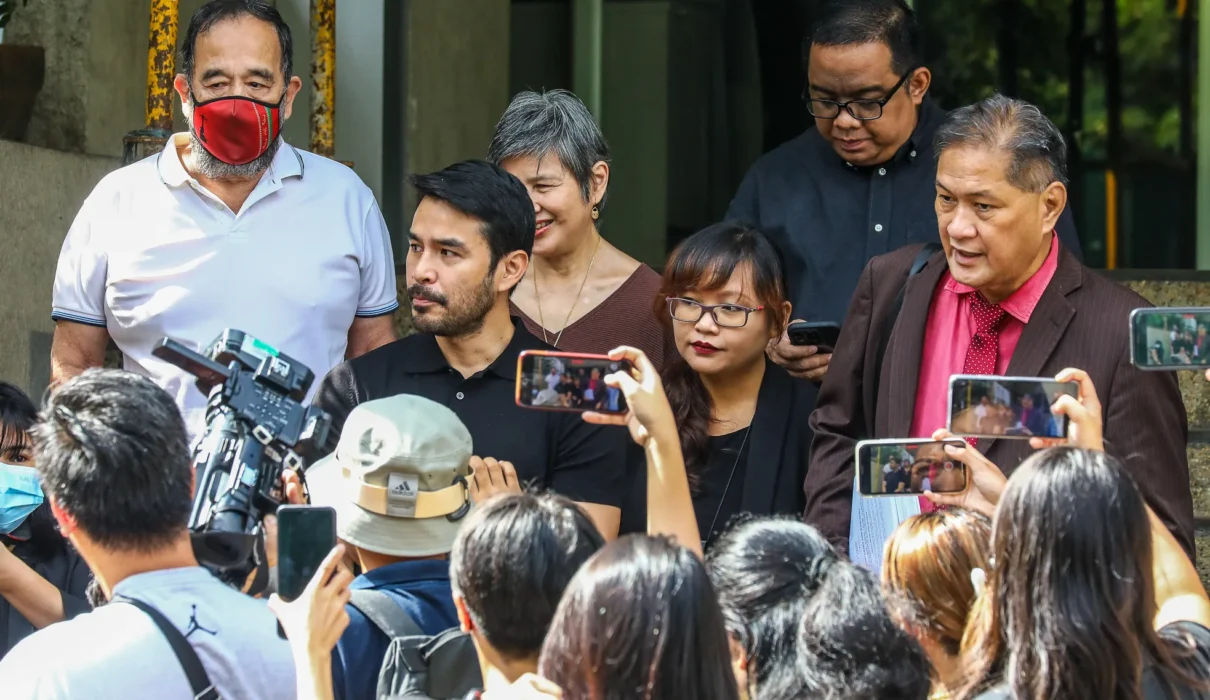MANILA, Philippines – Broadcast journalist Atom Araullo emphasized the plight of less protected journalists after filing a damage suit against red-taggers on Monday, September 11.
In a civil complaint filed against Sonshine Media Network International (SMNI) hosts Lorraine Badoy and Jeffrey Celiz, Araullo said red-tagging had been affecting his work as well as putting him and his family under emotional duress. SMNI is the media network of preacher and US fugitive Apollo Quiboloy.
Araullo said it was his privilege as a high-profile Philippine journalist that gave him access to resources to sue red-taggers. The journalist was represented by lawyers of the Movement Against Disinformation (MAD), including Tony La Viña and Rico Domingo.
Araullo, who works for the country’s leading media company, GMA Network, said the situation of other journalists is more worrisome than his.
(I am more worried for other journalists in other parts of the Philippines who are not as protected [as me]. Their threats are very real: they’re being visited in their houses, being intimidated, arrested, killed.)
“Red-tagging is just a specific form of intimidating members of the media whose reporting does not fit their particular agenda,” said Araullo.
Being a journalist himself, Araullo said he was careful in the type of complaint he filed. In his statement, he said he chose to file a civil instead of a criminal complaint because he doesn’t believe in the criminalization of libel. Libel has at times been used as a weapon to silence journalists.
Red-tagging also spoils the work of the media in relation to its role as the fourth estate in a democracy, said MAD chairman Rico Domingo.
“Red-taggers destroy the function of the journalists by suggesting political color on their reporting,” Domingo said in Filipino. “Red-tagging stifles dissent and infringes on the freedom of the press and expression.”
Infringement on press freedom
Other news outlets that became targets have also brought the issue of red-tagging to the courts.
Last April 2022, Rappler CEO Maria Ressa filed a complaint against Badoy before the Office of the Ombudsman. Alternative online news outfit Bulatlat, together with other outlets, also filed a complaint against Badoy in December 2020.
“As a media outfit that is repeatedly red-tagged, we know fully well the dangers and implications red-tagging brings to journalists and our work,” Bulatlat said in a statement of support for Araullo on Monday.
The National Union of Journalists of the Philippines (NUJP) emphasized the security threats that come from red-tagging for journalists who are only doing their work.
“This dangerous narrative is used to justify arrests, trumped-up charges, surveillance and other forms of harassment against human rights defenders, including journalists,” the guild said in its statement.
The NUJP added it’s time for red-taggers to “face the full force of the law” for the “lies they peddle.”
“Some of our colleagues have had to relocate, affecting the important work they do, and the communities they serve,” it said.
Meanwhile, NUJP Baguio chair and Baguio Chronicle chief editor Frank Cimatu was sympathetic with Araullo and his family’s experience after also being a target of Badoy and Celiz’s red-tagging.
“To be accused as an enemy of the state based on fantastic and made-up accusations just because you are doing your job is more than an obstacle, it is a menace and a burden,” said Cimatu.
On SMNI’s reporting
Asked about his view on SMNI’s reporting, Araullo said there were clear lapses committed by the organization.
“Ayoko naman i-gatekeep kung ano ang journalism,” he said. “Pero kung ito ay indikasyon ng ating pananaw sa kanilang programming, partikular sa programming ni Lorraine at Jeffrey, tingin ko may mga malinaw na lapses sa kanilang code of conduct, sa kanilang media ethics.”
Araullo refused to give a direct message to Badoy, Celiz, when asked by the press.
“Do I have any message? None in particular. This is my message,” he said, pointing to the copy of the complaint. “This case.”


